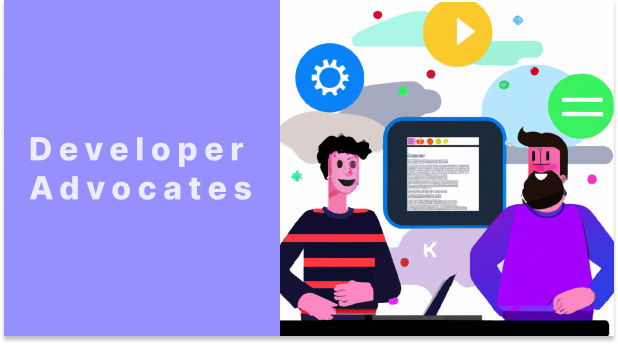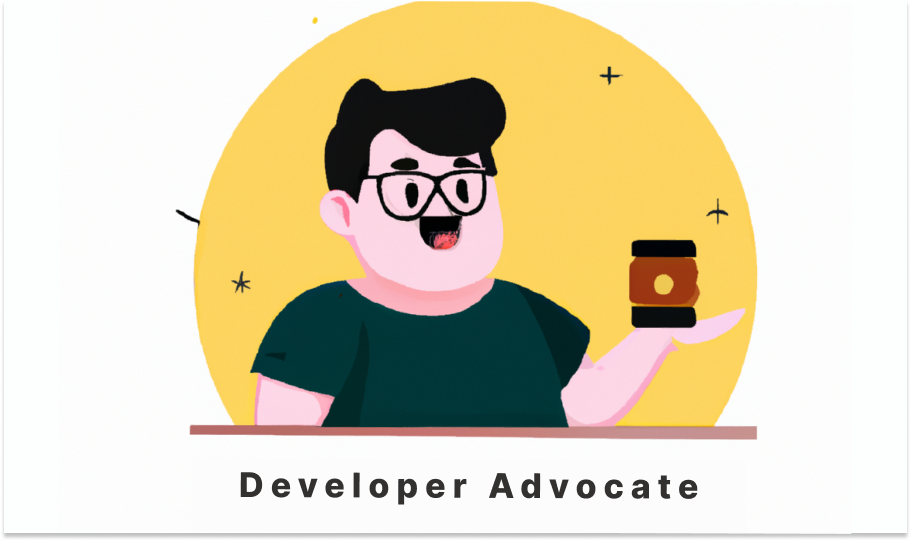Developer Advocates in the Tech Industry
The role of a "developer advocate" has gained significant traction in recent years, thanks to leading tech giants like Apple, Microsoft, Facebook, Twitter, and Google. This role is particularly prevalent in technology companies that cater to developers. But what exactly does it entail? Who can become a developer advocate, and what qualities are essential to succeed in this role?

Who is a Developer Advocate?
A developer advocate is typically a skilled programmer who plays a crucial role in an organization's success by bridging the gap between the organization and its relevant developer communities. Their primary responsibility is to empower developers to perform better and more efficiently in their jobs while ensuring products and services meet end users' needs. Developer advocates are usually part of developer relations teams, encompassing community managers and other teams responsible for cultivating and nurturing developer communities.
The term developer advocate is often confused with that of developer evangelist. Although they have some similarities, they are distinct from one another. While developer evangelists primarily focus on promoting their company's products and services to the developer community, developer advocates engage in two-way conversations. Developer advocates support developers in their jobs and advocate for their needs within the organization while engaging with the community to gain feedback on the company's products or services.
The Importance of Developer Advocates
Developer advocates ensure continuous improvement of products and services for organizations based on real-world feedback rather than theories or assumptions. These advocates are typically experienced developers who have a deep understanding of the products and services they represent or advocate for, and they work to create mutually beneficial relationships between the developer community and their company.
They help developers by offering free advice, guidance, and consultations to enhance their skills and ensure that companies build products and services that truly address developers' needs. By doing so, they can help their company gain a competitive advantage in the marketplace while also helping developers become more productive and successful.
The key Responsibilities of Developer Advocates
A developer advocate's main responsibilities encompass a wide range of activities that foster collaboration, knowledge sharing, and community engagement. This includes:
-
Participating in community events: Developer advocates actively participate in various events like meetups, conferences, and open spaces, where they share their expertise, network with developers, and gain insights into community needs. They also organize hackathons, which serve as platforms for developers to collaborate, learn, and showcase their skills while experimenting/working with the company's products or technologies.
-
Creating and sharing technical content: One of the core responsibilities of developer advocates is to generate and disseminate valuable content for the developer community. This could include writing blog posts, articles, and whitepapers or even championing research on specific topics. By sharing their knowledge, developer advocates help educate developers on best practices, new technologies, and industry trends, ultimately empowering them to build better products and services.
-
Collaborating with development teams: Developer advocates work closely with internal teams to introduce new technologies to help streamline and optimize development processes and delivery pipelines. Their unique perspective on community needs and industry trends enables them to provide valuable input on adopting cutting-edge tools and methodologies, ensuring the company's offerings remain relevant and competitive.
-
Providing feedback to enhance products or services: As developer advocates are often the first point of contact for developers using a company's products or services, they play a vital role in gathering feedback from the community. By orchestrating this feedback, they help the company identify areas for improvement and drive enhancements that make their product offerings more valuable to the community.
-
Improving technical documentation and participating in research projects: Developer advocates are responsible for crafting and refining technical documentation that is easy to understand and follow. They work alongside technical writers and engineers to ensure that the documentation meets the developer community's needs. Additionally, developer advocates may participate in internal research projects to explore new technologies, methodologies, or solutions that can benefit the developer ecosystem.
Who can Become a Developer Advocate?

Anyone with a passion for technology and a desire to support and empower developers can pursue a career as a developer advocate. The role requires a blend of technical skills and unique characteristics to succeed at it.
-
**Technical background: **A background in software development, programming, or a related field is essential. Familiarity with various programming languages, tools, and platforms is crucial for effectively communicating with developers and providing valuable insights.
-
Communication Skills: In order to create engaging content, deliver compelling presentations, and engage with the community consistently, it's imperative that they have excellent written and verbal communication skills. Developer advocates must be able to explain complex technical concepts in an accessible manner.
-
Community Engagement: A passion for participating in and supporting developer communities is essential. This might involve attending conferences, organizing events, or contributing to open-source projects. Building a strong personal network of developers can help create connections and amplify your advocacy efforts.
-
**Empathy and Understanding of Pain Points: **Developer advocates should be able to empathize with developers' needs and challenges and stay up-to-date with industry trends. This understanding is vital for providing effective support and guidance to both the community and the company.
-
Collaboration and Team-Work: Working closely with various internal teams, such as engineering, product management, and marketing, is a key aspect of the role. Developer advocates should be able to collaborate effectively and serve as a bridge between the company and the developer community.
-
Continuous Learning: The tech industry evolves rapidly, and developer advocates should be prepared to constantly learn and stay informed about new technologies, tools, and best practices.
By honing these skills and characteristics, anyone with a passion for technology can pursue a career as a developer advocate.
Conclusion
In summary, developer advocates serve as the liaison between the developer community and the companies creating the tools and technologies they use. Their responsibilities cover a broad spectrum of activities, from engaging with developers at events to creating and sharing technical content and collaborating with development teams. By doing so, they help foster a thriving developer ecosystem that benefits everyone involved.
Check out ConfigCat's Twitter, Facebook, LinkedIn, and GitHub to learn more.
